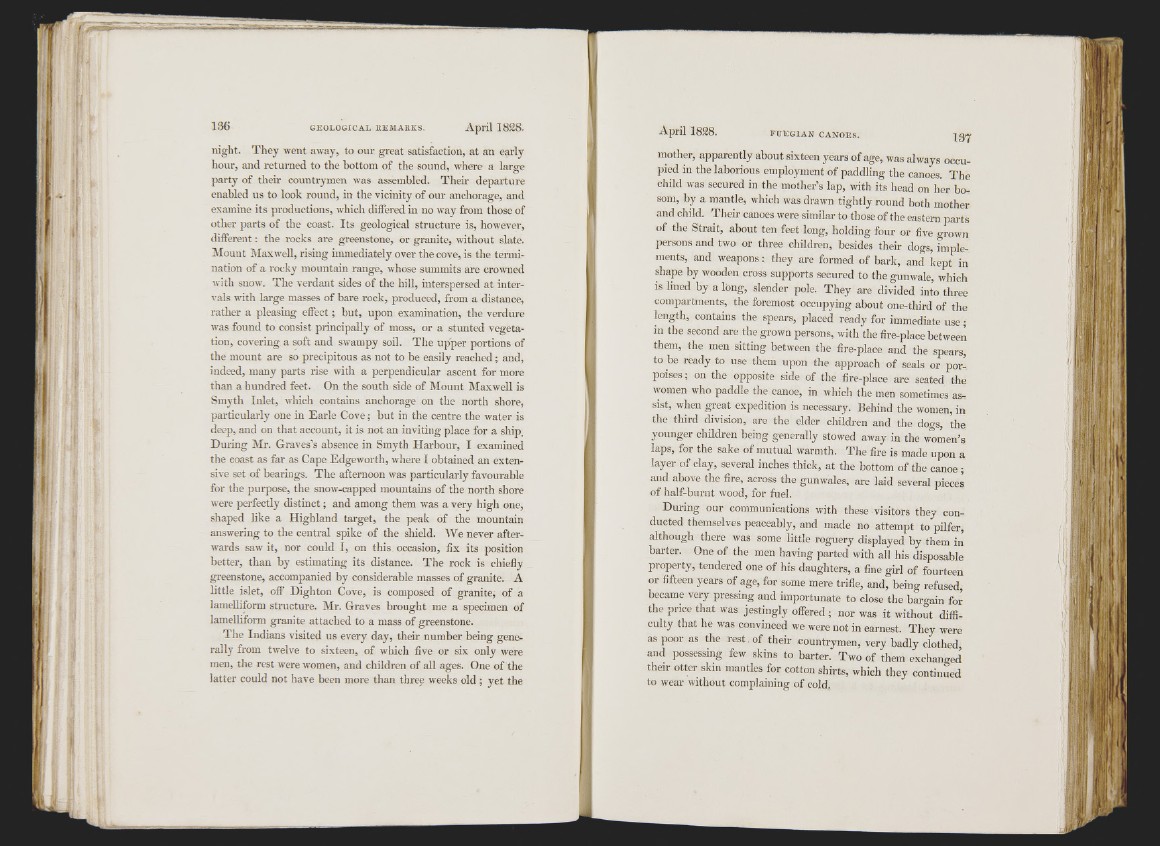
u
136 GEOLOGICAL l lEMAKKS, Aprill828.
night. They went away, to our great satisfaction, at an eai-ly
hour, and returned to the bottom of the sound, where a large
party of their countrymen was assembled. Their departure
enabled us to look round, in the vicinity of our anchorage, and
examine its productions, which differed in no way from those of
other parts of the coast. Its geological structure is, however,
different: the rocks are greenstone, or granite, without slate.
Mount Maxwell, rising immediately over the cove, is the termination
of a rocky mountain range, whose summits ai-e crowned
with snow. The verdant sides of the hill, interspersed at intervals
with lai-ge masses of bare rock, produced, from a distance,
rather a pleasing effect; but, upon examination, the verdure
was found to consist pi-incipally of moss, or a stunted vegetation,
covering a soft and swampy soil. Tlie upper portions of
the mount are so precipitous as not to be easily reached; and,
indeed, many parts rise with a perpendicular ascent for more
than a hundred feet. On the south side of Mount Maxwell is
Smyth IiJet, which contains anchorage on the north shore,
particularly one in Earle Cove; but in the centre the water is
deep, and on that account, it is not an inviting place for a ship.
During Mr. Graves’s absence in Smyth Harbour, I examined
the coast as far as Cape Edgeworth, where I obtained an extensive
set of hearings. The afternoon was particularly favourable
for the purpose, the snow-capped mountains of the north shore
were perfectly distinct; and among them was a very high one,
shaped hke a Highland target, the peak of the mountain
answering to the central spike of the shield. We never afterwards
saw it, nor could I, on this occasion, fix its position
better, than by estimating its distance. The rock is chiefly
greenstone, accompanied by considerable masses of granite. A
little islet, off Dighton Cove, is composed of granite, of a
lamelliform structure. Mr. Graves brought me a specimen of
lamelliform granite attached to a mass of greenstone.
The Indians visited us every day, their number being generally
from twelve to sixteen, of which five or six only were
men, the rest were women, and children of all ages. Cne of the
latter could not have been more than three weeks old ; yet the
mother, apparently about sixteen years of age, was always occupied
in the laborious employment of paddling the canoes. The
child was secured in the mother’s lap, with its head on her bosom,
by a mantle, which was drawn tightly round both mother
and cliild. Their canoes were similar to those of the eastern parts
of the Strait, about ten feet long, holding four or five grown
persons and two or three children, besides their dogs, Tmple-
ments, and weapons: they are formed of bark, and kept in
shape by wooden cross supports secured to the gunwale, which
is lined by a long, slender pole. They are divided into three
compartments, the foremost occupying about one-third of the
length, contains the spears, placed ready for immediate use;
in the second are tlie grown persons, with the fire-place between
them, the men sitting between the fire-place and the spears,
to be ready to use them upon the approach of seals or por/
poises; on the opposite side of the fire-place are seated the
women who paddle the canoe, in which the men sometimes assist,
when great expedition is necessary. Behind the women, in
the third division, are the elder cliildren and the dogs, the
younger children being generally stowed away in the women’s
laps, for the sake of mutual warmth. The fire is made upon a
layer of clay, several inches thick, at the bottom of the canoe ;
and above the fire, across the gunwales, are laid several pieces
of half-burnt wood, for fuel.
During our communications with these visitors they conducted
themselves peaceably, and made no attempt to pilfer,
although there was some little roguery displayed by them in
barter. One of the men having parted with all his disposable
proprty, tendered one of his daughters, a fine girl of fourteen
or fifteen years of age, for some mere trifle, and, being refused,
became very pressing and importunate to close the baro-ain for
the price that was jestingly offered; nor was it without difficulty
that he was convinced we were not in earnest. They were
as poor as the rest of their countrymen, very badly clothed,
and possessing few skins to barter. Two of them exchano-ed
their otter skm mantles for cotton shirts, which they continued
to wear without comjfiaining of cold.
Vi
: